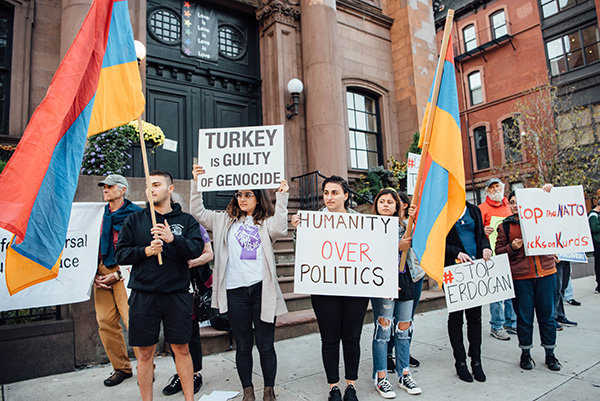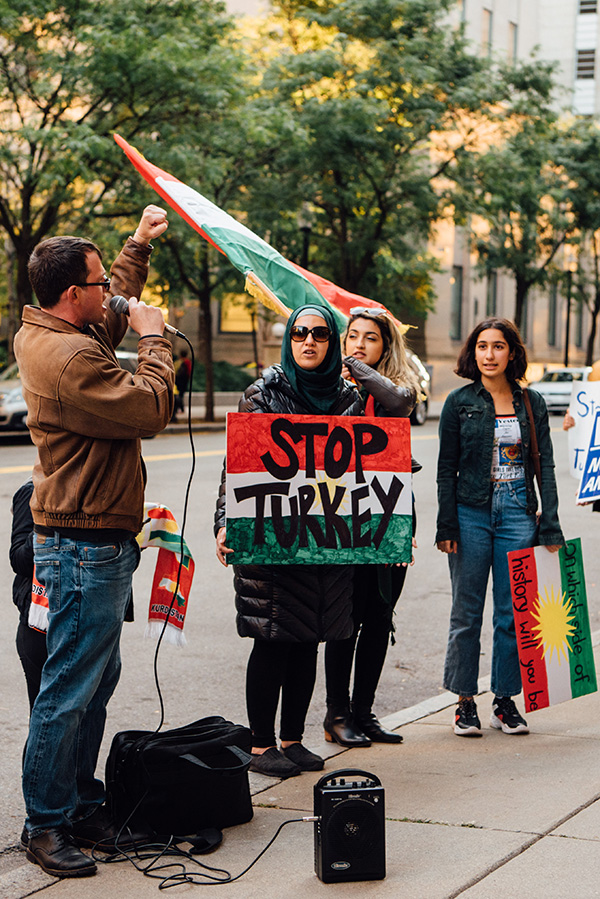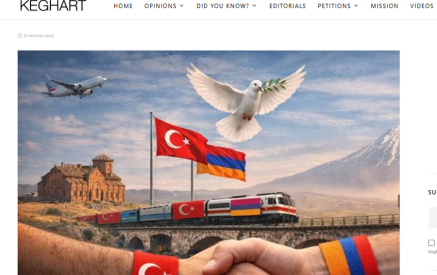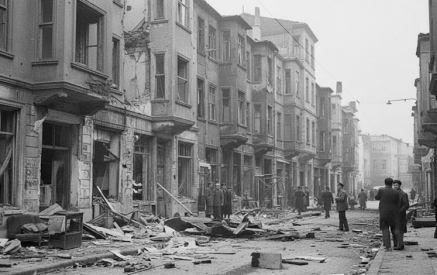The Armenian Weekly. It has been a very difficult week for humanity. Whenever human life is lost, we must pause and reflect. When those lives are lost because of unilateral aggression and a wanton disregard for human rights, our voices must be heard. When the conflict is related to our personal tragedy, we have a responsibility. The events that have been developing over the past week in northern Syria are a horrific reminder that advances in technology, medical sciences and economics do not necessarily equate to progress in human rights. I will leave the politics of this tragedy for other forums. This is a human rights catastrophe. Regardless of your political perspectives in the tangled web we call the Middle East and in particular the Kurdish area of northern Syria, no human being should be subjected to the brutality administered by the Turks and their “allies” to the Kurdish population. How many times have we talked about the massacres and atrocities committed against the Yazidis, the Kurds, the Christians and others in Syria alone in the last seven years? Yet we profess the advances of our civilization. When these upheavals occur, we have all failed. The UN Security Council can’t agree. The great powers seem to view these atrocities as collateral damage for global politics. Everyone seems either ambivalent, depressed or powerless. This is not 1915. Or is it?
Today we have global and instantaneous communication. Everything is visible. This isn’t the isolated highlands of western Armenia where only a few missionaries and military personal observed the genocide of the Armenians, where limited reporting was hidden under the cloud of a world war. We see evidence every day on cable and network news. Yet it does not seem to matter. Information does not seem to impact prevention. It is an endless loop. Who’s next?
This is not 1915. Or is it?
My generation did not experience the genocide. We knew our grandparents as survivors. Although many did not discuss their journey, they instilled in us a clear sense of responsibility that we have tried to apply in our lifetime. It is rare for any of us to advocate on the genocide issues without thinking of our grandparents. Long after they have left this earth, they still remain an inspiration in our hearts. It is difficult to explain, but it has become a very personal issue for us.Thinking of marauding Turks slaughtering our ancestors is a permanent etch mark in our memory. It is there. How we handle our emotions is the question. Each time in my life that I have seen the Turkish government commit these horrific acts of human rights violations, I feel a dull ache whose source is the unfulfilled justice for the crime of our genocide. I felt this way in 1974 when the Turks invaded Cyprus. A similar feeling when the Turks attacked Kurdish districts of Diyarbekir inflicting massive damage to life and property. Incursions into northern Iraq have been a regular occurrence for years. And now we are witnessing the human rights invasion in northern Syria. As an Armenian living without justice, these events shake my soul. Why? The lack of accountability for the crime denies justice for the Armenians. Yet repeating the same behavior confirms the impact of not holding the criminals responsible. It is repeated again…and again.
Read also
This repetitive pattern has brought us to northern Syria in 2019. We know all too well what is really going on. Buzz words like “terrorists,” “security” and “peace” used by the Turks are really code for “murder,” “displacement” and “altering demographics.” Why do we know? Because our people are unique. We didn’t ask to be unique. Hatred by others decided that. Cambodians, Bosnians, Jews, Rwandans and those of Darfur are unique also. We all faced evil and stared it down. We survived and have recovered to claim the justice that has been denied. But what will we do with our survival? Is it just for us to enjoy, or is there a responsibility that comes with this label? Should our voices be committed directly to our interests? Sounds rather shallow and very short-sighted. Reaching out to others in their times of need is a blessing that is both our opportunity and responsibility. Compassion is what separates the human race from other living species. When it comes to ethnic cleansing, genocide or massacres, our unique experience makes us very qualified to stand up and be heard. As victims of atrocities, we must be the FIRST to raise our voices and say “no” to human rights abuses and “yes” to the rights of all humans to be free of oppression.
Sounds logical, but let’s look in the mirror for a moment. We may be unique, but we are not perfect. Our behavior in this regard has been a bit inconsistent. As an ethnic group, we are remarkably clannish. As Diasporans, this is not necessarily a bad attribute. We look out for each other. We find comfort with one another. We build a sense of community. Although we choose to ignore it most of the time, there is a downside to this behavior. We are overly introspective; we are improving. The trend is positive, but we are lagging in treating others as we expect to be treated. Case in point. The recognition of the Armenian Genocide. We spent an incredible amount of our communal resources on this issue. We have an expectation that all of humanity (well, almost all) should support us in seeking justice for the crimes committed. This is not an unreasonable expectation, however let’s reverse the process. Do we extend our hands to those in this world who are suffering from the scourge of genocide or ethnic massacres? Yes, we have begun to institutionally increase our outreach, but the average member of our community does not hold this as an important value. Our responses tend to be “safe.” Inviting speakers from other genocides is noble, but not exactly trailblazing. Even our Republic of Armenia only recently (last few years) officially recognized the Assyrian Genocide. We still tend to “fly solo” when it comes to our causes. Collaboration is a critical element of success for human rights causes such as ours. It is selfish not to embrace the pain of others. It fails to fulfill our responsibility as victims of horrific crimes.
Another impediment to taking responsibility as world citizens is getting past our prejudices. In our isolated world, it is easy to stereotype. Despite the horrific nature of the Kurdish dilemma, many Armenians remain ambivalent, because of the Kurdish role in the Armenian Genocide. The complicity of many Kurds is a fact. It is also a fact that many Kurds saved Armenians 100 years ago. It is also true that Syrian Kurds (YPG) and the Pershmerga in Iraq have defended Armenian enclaves against ISIS in those regions. In Turkey (western Armenia), the Kurds have gone through many years of public remorse for the past with credible efforts in the present. The pro-Kurdish HDP Party has spoken openly about the genocide. Local Kurdish politicians in Diyarbekir have been active in the rebuilding of St. Giragos Armenian Church, have supported Armenian signage on streets and Armenian language classes. Is it enough to open our hearts and our minds to a new reality? Is there such a thing in our world as redemption? No one is asking or should ask the Armenians to be politically naive. After all, at its core, this is a human rights issue. Our negative views (frequent comments such as “the Kurds killed Armenians so I don’t trust them” or “they are getting what happens when you trust the Turks”) are fueled by outdated reference points and core anger. We fought the Greeks for centuries in border clashes in pre-Ottoman periods, but love Greeks today. Is it because they are Christians, or because they suffered a common fate to the Turks? If it’s the latter, the Kurds seem to have paid their entry into that club.
This will be an increasingly important issue for our nation as more Turkish people embrace the truth of the genocide. The point is that if we lead with human compassion, it will not only serve our moral responsibility, but serve as a reasonable method of engaging people we have traditionally shunned. Whether we care to admit it or not, these are people that we increasingly have points of common interest.

AYF Greater Boston “Nejdeh” Chapter members pictured during the pro-Kurdish rally, October 15, 2019 (Photo: Knar Bedian)
Fortunately there are many visible signs of a more engaging nation. Our youth today are more connected to these realities and more emotionally free of the past. Our activist youth have openly engaged with the Kurdish community in many locations to lend empathy for the human rights tragedy we are all experiencing. The numbers are modest, but the intent is honorable. We would all be wise to open our minds and let the fresh air of human compassion guide us. Our church has a major role in teaching compassion as a core value. Perhaps, the horror of the Turkish assault on the Kurds in 2019 and the resulting psychological trauma to other victim communities are bringing us to a new place. We have a unique role to play. As part of our inheritance, we have a responsibility to remember and to never be silent when we witness human atrocities.
Main photo: Knar Bedian – Pro-Kurdish rally in Boston, Mass., October 15, 2019























































